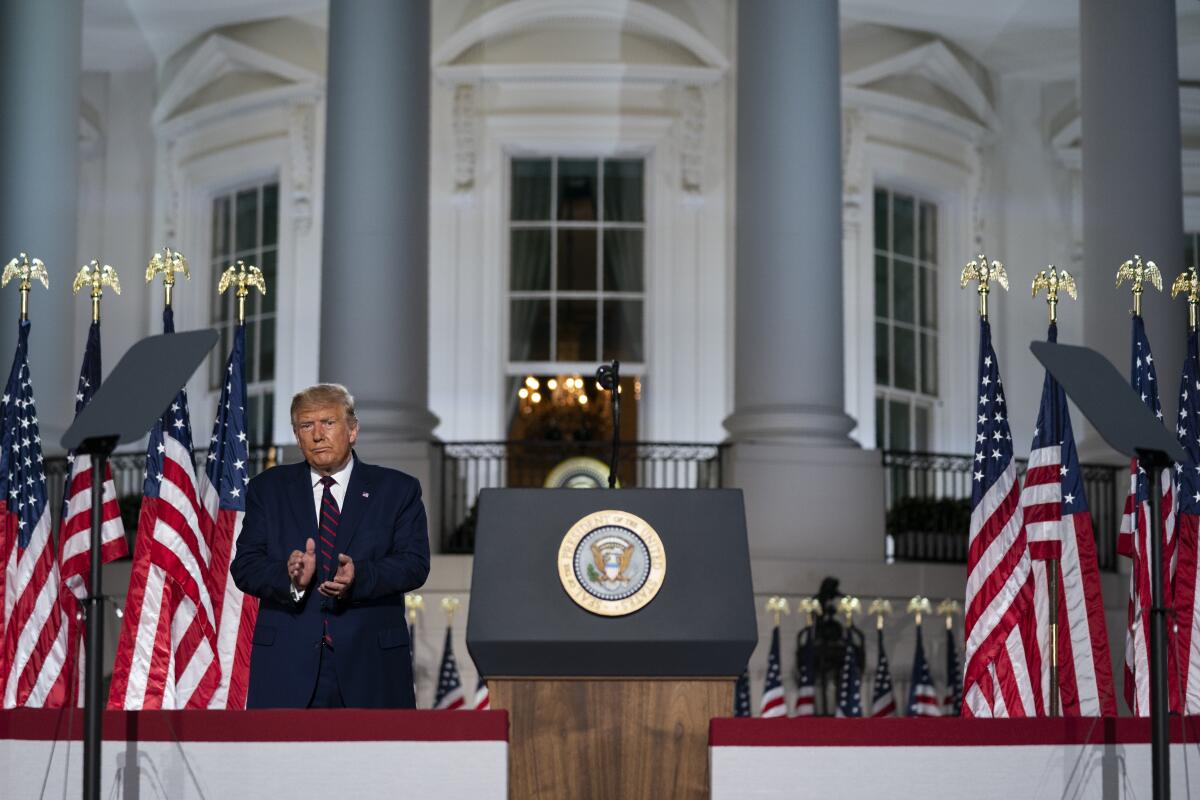Newsletter: Opinion: Trump auditions for autocrat. We make the call

- Share via
Good morning. I’m Paul Thornton, and it is Saturday, Aug. 29, 2020. Fifty years ago today, L.A. Times journalist Ruben Salazar was killed by a Los Angeles County sheriff’s deputy while covering the Chicano Moratorium march in East Los Angeles. Click here to read more about Salazar, and here to read our 50th anniversay coverage of the moratorium. Now, let’s take a look back at the week in Opinion.
It’s a scene you would expect in North Korea: The leader emerges from his palace to an oddly adoring audience, the collective assets of the state marshaled to exalt him, while out of view the masses endure a health crisis and economic malaise. This describes most recently what happened not in Pyongyang or in Minsk, but on the final night of the Republican convention in Washington, the capital of a nation that prohibits abusing public resources the way an autocrat would.
Heading into the final months of the 2020 campaign, the two parties’ conventions put everything out there for voters to make their choice: Do we select leaders who, at a bare minimum, possess adult quantities of empathy and competence, or do we endorse a president who has all but announced his indifference to American suffering and his intent to misuse his power? As editorial writer Scott Martelle put it, the conventions have shown this election to be as much about the values of the candidates as the values of the American people.
A cure for the common opinion
Get thought-provoking perspectives with our weekly newsletter.
You may occasionally receive promotional content from the Los Angeles Times.
And what about those conventions? The pre-coronavirus mass gatherings of delegates and other party faithful had the ostensible purpose of selecting the party’s nominee, but the made-for-TV programming laid bare what we have long known about these quadrennial affairs: Conventions have come to be more about propaganda than party business. Columnist Nicholas Goldberg suggests a fix: no more conventions, virtual or in-person.
Still looking for President Trump’s soft side: White House press secretary Kayleigh McEnany was among the GOP convention speakers vouching for the president’s character when she described herself as “an American with a preexisting condition” who supports Trump. In a week filled with cognitive dissonance, McEnany’s remark was the high point of surreality, delivered after years in which the Trump administration tried to dismantle the law that protected people like her. Jon Healey writes: “She probably should hope Trump stops having any say at all in healthcare policy as of January. After all, she has a pretty serious preexisting condition.” L.A. Times
The law might be coming out of New York for Trump. The Manhattan U.S. attorney charged the president’s former campaign manager Steve Bannon with a crime, and if there’s anyone who knows something about Trump and needs to cooperate with federal officials now, it’s Bannon. In another case, New York’s attorney general revealed she’s probing the finances of the Trump Organization. “There are some serious legal risks to Trump from each of these investigations,” writes Harry Litman. Here’s the catch: “They’re pressing only if he isn’t reelected.” L.A. Times
He’s a Republican, and he’s relieved by what he saw at the GOP convention. “Make America Normal Again” is hardly the best argument for reelecting Trump; after all, he’s the president, and every unsettling thing happening right now has been under his watch. But if you’re a Republican, former GOP strategist Scott Jennings says you have to be encouraged by the president’s emphasis on the difference between his law-and-order vision for America and Joe Biden’s view. L.A. Times
Enjoying this newsletter? Consider subscribing to the Los Angeles Times
Your support helps us deliver the news that matters most. Become a subscriber.
Remind you of another state? It was a testing ground for anti-immigrant laws, but now younger Latino voters drive a backlash. The extremism of local Republicans has put off not only liberals but also moderates and libertarians. An ascendant Democratic Party, newly organized after spending years in the political wilderness, is ready to take charge. This is Arizona today, according to an op-ed in the New York Times, but you could have written the same thing about California years ago. New York Times
The Chicano Moratorium of 1970 still has plenty of lessons for today. In the 1960s, Mexican Americans were dying in the Vietnam War far out of proportion to their numbers in the total population, prompting a movement that would culminate in the Chicano Moratorium march on Aug. 29, 1970. And today, in the COVID-19 pandemic, Latinos once again account for a disproportionate share of total deaths. “Given our situation in 2020, I propose looking back to the Chicano Moratorium to help illuminate these dark times and inspire a new generation of activists,” writes historian Ernesto Chávez. L.A. Times
Stay in touch.
If you’ve made it this far, you’re the kind of reader who’d benefit from subscribing to our other newsletters and to the Times.
As always, you can share your feedback by emailing me at paul.thornton@latimes.com.
A cure for the common opinion
Get thought-provoking perspectives with our weekly newsletter.
You may occasionally receive promotional content from the Los Angeles Times.




